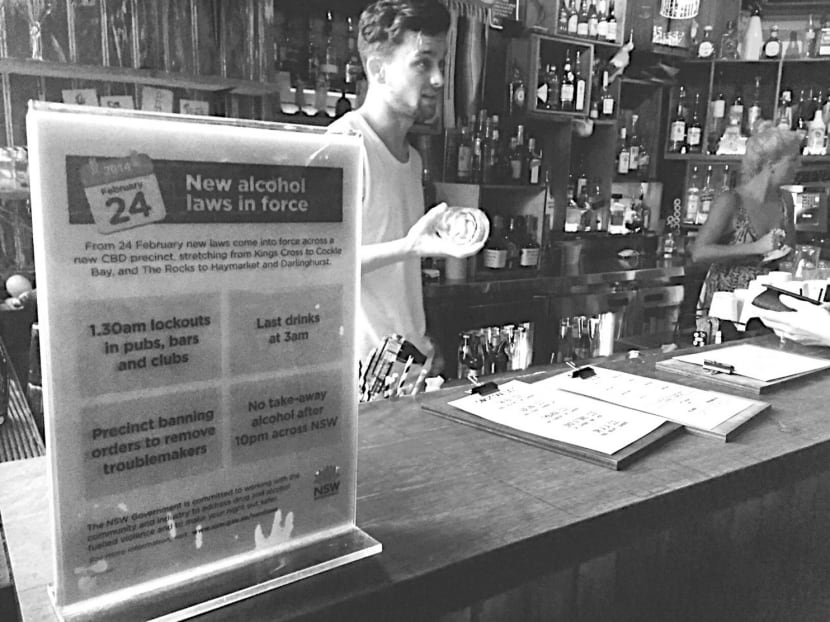What Singapore can learn from Sydney’s alcohol control laws
The entertainment district of Kings Cross in Sydney used to pulsate with life on Friday and Saturday nights. But footfall to the area has decreased dramatically in recent years.

A bar in Sydney’s popular entertainment district of Kings Cross makes sure its patrons are aware of the alcohol restrictions in place. Photo: Kimberly Spykerman
The entertainment district of Kings Cross in Sydney used to pulsate with life on Friday and Saturday nights. But footfall to the area has decreased dramatically in recent years.
There is good reason for this. Calls to curb booze-fuelled bashings have grown louder, especially with one-punch assaults making headlines. In December last year, The Sydney Morning Herald reported that these random, unprovoked attacks have led to 90 lives being lost since 2000.
As the name suggests, unsuspecting victims of such assaults either died from a single blow to the head, or after they fell and struck their heads on the pavement. Most of these beatings were fuelled by alcohol. New South Wales also recorded the highest number of these deadly attacks in that period.
The authorities came down hard on the sale and consumption of alcohol in precincts such as Kings Cross that are heavily populated by watering holes. They are now subject to tougher licensing conditions that include extensive closed-circuit television (CCTV) coverage of the premises, banning the use of glass after midnight to serve alcohol, and reinforcing 1.30am lock-outs — which means no entry for new patrons.
The measures aim to minimise the risk of a fun night out being marred by episodes of drunken violence. And it has seen some success. Indeed, I felt a keen sense of order and safety in Kings Cross on a recent visit with a team from Singapore’s Home Affairs Ministry.
Australia is among the countries being studied by the ministry for its liquor control measures, as Singapore looks to introduce its own next year. Although a review of liquor control regulations began in 2012, last year’s riot in Little India and the subsequent recommendations by a Committee of Inquiry provided greater impetus.
While it benefits Singapore to learn from the experience of other countries in drafting new laws, it is important to be aware of the differences. In some Australian cities, bouts of senseless violence prompted the government to effect stricter measures in areas where crowds gather to knock back a few drinks. It is different in Singapore.
To the public, it may seem that the riot in Little India is the cataclysmic force behind the liquor control measures. This could raise questions about whether the new rules are an overreaction, given that it has been more than four decades since Singapore experienced a public order disturbance.
ALCOHOL CONTROL
It goes without saying that ensuring the safety of the public takes top priority, and that whatever can be done to achieve this must be carried out — even if that means a total ban on alcohol.
The new regulations are not likely to be so extreme. The ministry has let on that they will probably cover conditions on the sale of liquor, consumption in public areas, and penalties for alcohol-related offences.
But it is crucial that the legislation does not tip too far against the interests of those in the business community. Already, restrictions on the sale and consumption of alcohol in Little India have resulted in fewer visitors and slower takings for businesses there, especially those whose main trade is in liquor.
The authorities should also ensure that the controls do not strip the area of its vibrancy — something that businesses in Kings Cross can attest to. Kings Cross now draws only 5,000 people on a Friday and Saturday night, down from a high of 22,000 two years ago, said Mr Christopher Cheung, chairman of the Kings Cross Liquor Accord.
Singapore could, however, learn a thing or two from the Australian system, such as giving nightspot operators a stake in building a responsible drinking culture on their premises. This means shouldering the costs of some of their licence conditions — for example, by paying for marshals to promote the responsible service of alcohol to patrons, or purchasing ID scanners that reinforce banning orders of those convicted of alcohol-related violence.
Breaching these could mean a strike against the establishment. Three strikes, and you could be out — of a licence, that is. This reinforces social responsibility which laws and punitive measures alone cannot cultivate. Singapore could eventually look to emulate this, if irresponsible drinking behaviour and its consequences are to be tackled at the root. Or use a “name-and-shame” list as the Australians do, where the names of venues with high numbers of violent incidents are made public with additional licence conditions to boot. It has proven to be effective, given that numbers on that list have fallen consistently since its implementation.
The Australian authorities also apply stricter conditions on liquor sales and public consumption to precincts deemed high-risk. A similar approach could be followed here with measures targeted at a specific problem area.
The immediate task is to help Singapore businesses see merit in implementing liquor control measures, especially when the long-term benefits are not immediately apparent.
As Second Minister for Home Affairs S Iswaran noted, it is only natural that businesses have their concerns, but alcohol restrictions can create a more conducive environment for tourists, businesses, and even locals.
A clear and fair law that takes into account all concerns will go a long way in making what is an already bitter pill easier to swallow.
ABOUT THE AUTHOR:
Kimberly Spykerman is a senior reporter at ChannelNewsAsia.









